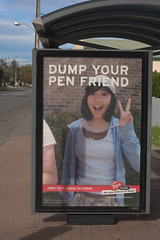Creative commons licensing gives content producers control over who uses their work and how.
I use a creative commons license on nearly all the photos I post to flickr and often use photos borrowed from flickr, with the proper attribution (and often with express permission), as the background image on powerpoint slides.
Until now, I’ve never thought about the people in those photos having any legal rights over the use of their likeness but a case arising from exactly that has been filed in a US District Court.
The New York Times reports that 15 year old student Alison Chang and her family have filed suit against Virgin Mobile Australia in a Federal District Court in Dallas. This isn’t a simple case involving the misuse of someone’s copyright protected images – it’s a privacy case involving the subject of a photo uploaded to flickr with a creative commons license applied to it. The New York Times explains:
"The conduit for this unusual bit of cultural exchange, it quickly emerged, was the Flickr photograph-sharing service, which is owned by Yahoo. The image had been uploaded to the site by the photographer, Justin Ho-Wee Wong, Alison’s church youth counselor…
In another Flickr twist to the Virgin Mobile case, it was a Flickr member from Adelaide, Brenton Cleeland, who first noticed the ad on Churchill Road and, naturally, photographed it to share on Flickr. In the spirit of a site populated with amateur photographers in search of an audience, Mr. Cleeland wanted to spread the news of Mr. Wong’s success. “I wonder if he knows that his photo is being used here,” he wrote in a posting, adding, “Anyway, congratulations!”
Alison, however, was the first to chime in online, and was hardly as pleased: “Hey that’s me! no joke. i think i’m being insulted.”
Chang v. Virgin Mobile USA is not the typical intellectual property rights case. A prolific member of Flickr, Mr. Wong has more than 11,000 photographs there that anyone with the time or inclination could page through. And, until recently, those photographs carried a license from Creative Commons, a nonprofit group seeking alternatives to copyright and license laws. The license he selected allowed them to be used by anyone in any way, including for commercial purposes, as long as Mr. Wong was credited.
Instead, the case hinges on privacy, the right of people not to have their likeness used in an ad without permission. So, while Mr. Wong may have given away his rights as a photographer, he did not, and could not, give away Alison’s rights. In the lawsuit, which Mr. Wong is also a party to, there is an argument that Virgin did not honor all the terms of the nonrestrictive license."
